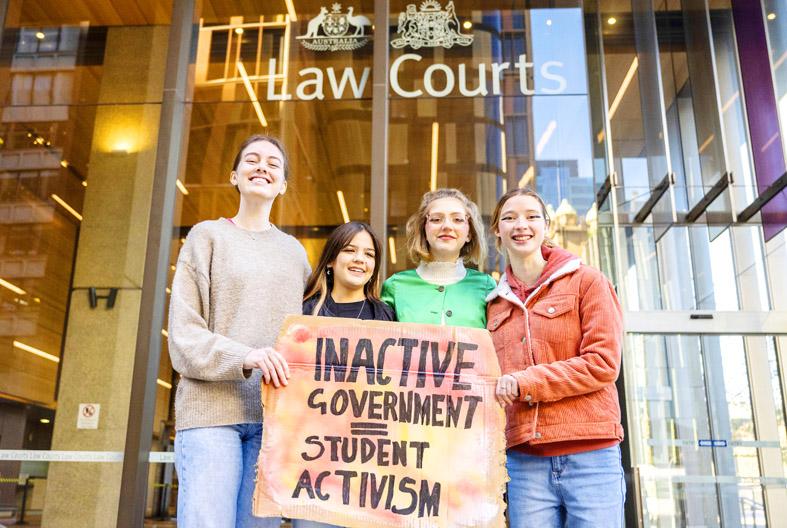An Australian court yesterday threw out a landmark legal ruling that the nation’s environment minister had a duty to protect children from climate change.
Last year’s legal win by a group of high-school students had been hailed by environmental groups as a potential legal weapon to fight fossil fuel projects, but the federal court found in favor of an appeal by Australian Minister for the Environment Sussan Ley, deciding she did not have to weigh the harm climate change would inflict on children when assessing the approval of new fossil fuel projects.
The judgement overturned a ruling in July last year by a lower court that found the minister had a duty to “avoid causing personal injury or death” to under 18s due to “emissions of carbon dioxide into the Earth’s atmosphere.”

Photo: AP
Anjali Sharma, 17, who launched the legal action in 2020, said the minister’s successful appeal had left the students “devastated.”
“Two years ago, Australia was on fire; today, it’s under water. Burning coal makes bushfires and floods more catastrophic and more deadly. Something needs to change,” Sharma said.
Izzy Raj-Seppings, 15, said the court had accepted that young people would “bear the brunt of the impacts of the climate crisis,” which she described as an important step in climate litigation.
However, the federal court found emissions from the mine at the center of the case — Whitehaven’s Vickery coal mine — posed only a “tiny increase in risk” to the students.
Ley welcomed the verdict.
“The minister always takes her role as the environment minister seriously,” a spokesperson said in a statement.
Lawyer George Newhouse of Macquarie University said that the Sharma decision reflected Australia’s lack of a bill of rights.
“We don’t have the scope for the successful climate change litigation that we see in Europe because Australia has a constitution that, quite intentionally, contains no human rights,” Newhouse said.
He said landmark cases, such as the Urgenda precedent — in which Dutch citizens successfully sued their government to take climate action — would fail in Australia because of this.
“I am disappointed by the Sharma decision, but not surprised,” he said.
Sharma and her fellow students are considering whether to appeal to Australia’s highest court.
Climate and environmental law expert Laura Schuijers from the University of Sydney said the High Court might well elect to hear their appeal, given the importance of the questions raised.
Schuijers said Australia’s lack of a constitutional protection of human rights made it “a very interesting place for climate litigation.”
“It means that litigants are seeking creative ways to test the bounds of the law and to ask the ultimate question: In the face of inaction, who is responsible for picking up the slack?” she said.
The ruling had “put the spotlight on Australia’s politicians and policymakers to take the proactive action that the science presented in the courtroom suggests is urgently needed,” she added.
Australia has been at the sharp end of climate change, with droughts, deadly bushfires, bleaching events on the Great Barrier Reef and floods becoming more common and intense as global weather patterns change.

‘SHORTSIGHTED’: Using aid as leverage is punitive, would not be regarded well among Pacific Island nations and would further open the door for China, an academic said New Zealand has suspended millions of dollars in budget funding to the Cook Islands, it said yesterday, as the relationship between the two constitutionally linked countries continues to deteriorate amid the island group’s deepening ties with China. A spokesperson for New Zealand Minister of Foreign Affairs Winston Peters said in a statement that New Zealand early this month decided to suspend payment of NZ$18.2 million (US$11 million) in core sector support funding for this year and next year as it “relies on a high trust bilateral relationship.” New Zealand and Australia have become increasingly cautious about China’s growing presence in the Pacific

The team behind the long-awaited Vera Rubin Observatory in Chile yesterday published their first images, revealing breathtaking views of star-forming regions as well as distant galaxies. More than two decades in the making, the giant US-funded telescope sits perched at the summit of Cerro Pachon in central Chile, where dark skies and dry air provide ideal conditions for observing the cosmos. One of the debut images is a composite of 678 exposures taken over just seven hours, capturing the Trifid Nebula and the Lagoon Nebula — both several thousand light-years from Earth — glowing in vivid pinks against orange-red backdrops. The new image

ESPIONAGE: The British government’s decision on the proposed embassy hinges on the security of underground data cables, a former diplomat has said A US intervention over China’s proposed new embassy in London has thrown a potential resolution “up in the air,” campaigners have said, amid concerns over the site’s proximity to a sensitive hub of critical communication cables. The furor over a new “super-embassy” on the edge of London’s financial district was reignited last week when the White House said it was “deeply concerned” over potential Chinese access to “the sensitive communications of one of our closest allies.” The Dutch parliament has also raised concerns about Beijing’s ideal location of Royal Mint Court, on the edge of the City of London, which has so

Canada and the EU on Monday signed a defense and security pact as the transatlantic partners seek to better confront Russia, with worries over Washington’s reliability under US President Donald Trump. The deal was announced after a summit in Brussels between Canadian Prime Minister Mark Carney and European Commission President Ursula von der Leyen and European Council President Antonio Costa. “While NATO remains the cornerstone of our collective defense, this partnership will allow us to strengthen our preparedness ... to invest more and to invest smarter,” Costa told a news conference. “It opens new opportunities for companies on both sides of the